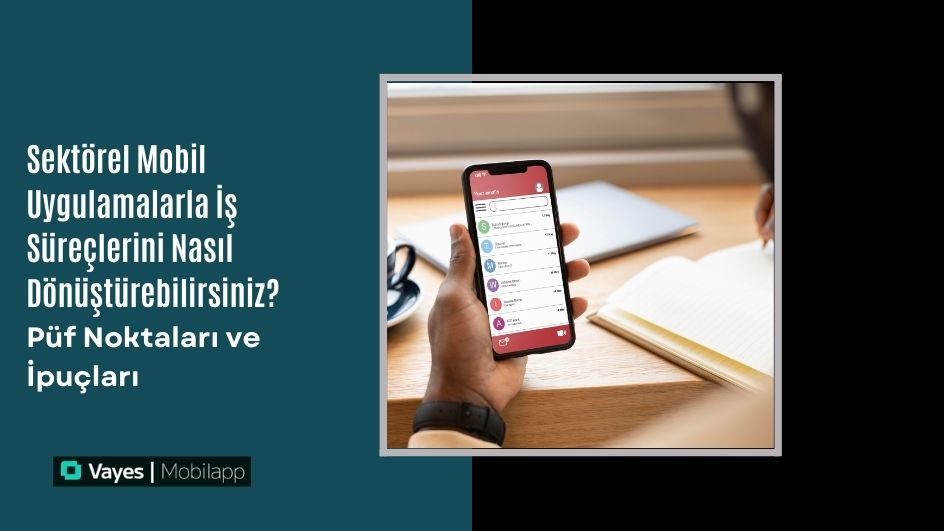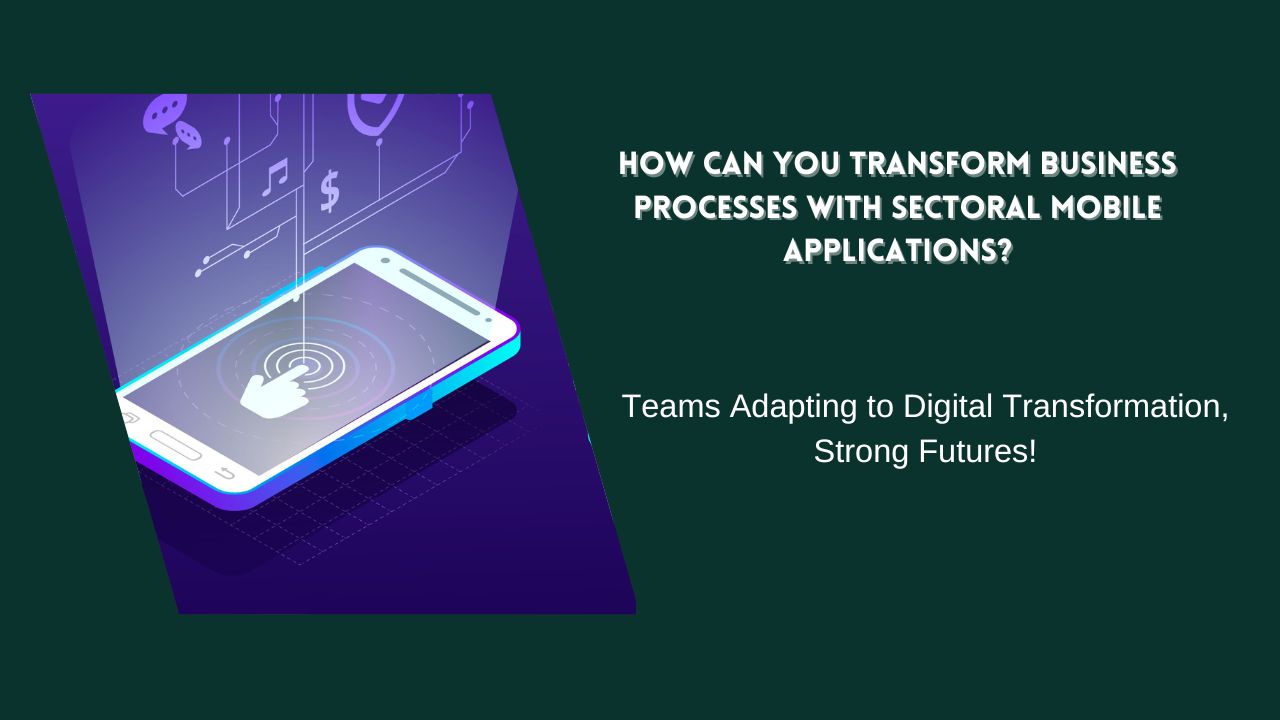Hello,
How Can We Help You?
Contact Form
Fill out the form and we will contact you as quickly as possible.
|

Industry-specific mobile applications are creating a significant transformation in the business world, offering substantial opportunities, especially for entrepreneurs, startups, and SMEs. With the rapid advancement of technology, companies are digitizing their business processes to become more efficient, faster, and customer-centric. Mobile applications are powerful tools that not only enhance operational efficiency and customer satisfaction but also enable improvements across all areas of a business.
At Mobilapp, we provide industry-specific mobile application solutions, developing tailored software for the unique needs of businesses across various sectors and transforming their processes. For entrepreneurs, startups, and SMEs in particular, the digitization of business processes enhances their competitiveness. In this process, we offer designs and functional features tailored to industry-specific requirements, strengthening both the operational processes and customer relationships of brands. These applications enable faster and more accurate data processing, quicker decision-making, increased efficiency, and improved customer satisfaction.

Industry-specific mobile applications offer multifaceted advantages to businesses. First, they enable the acceleration of business processes through digitization. Companies can eliminate time losses by automating manual processes, allowing them to deliver services more quickly. Mobile applications make data real-time accessible, helping optimize workforce and resource management. Employees and managers can access data from anywhere at any time, enabling instant decision-making.
The second key advantage is the improvement in customer experience. Industry-specific mobile applications allow companies to interact with their customers more effectively. With personalized services, notifications, and quick responses, these applications boost customer satisfaction. For example, an e-commerce app can recommend products based on users’ purchase history, encouraging more sales. Similarly, a service industry app can efficiently meet customers’ needs, such as booking appointments or accessing services quickly, becoming a key factor in increasing customer loyalty.
The development process of industry-specific mobile applications involves several critical factors that require careful planning. First, the application’s target audience and the specific needs of the industry must be thoroughly analyzed. Since each industry has unique requirements, these characteristics should be considered in the app’s design. For instance, a healthcare app should have features to store and process patient information securely. Similarly, a logistics app can enhance efficiency by offering features like route optimization.
Another important consideration is creating a user-friendly design. Mobile applications should be designed to easily meet users’ needs. A simple, clear, and accessible interface is essential for users to navigate the app comfortably. In app design, user experience (UX) and user interface (UI) play a significant role. At Mobilapp, we design effective and efficient applications during the industry-specific app development process, keeping the target audience’s expectations and functional requirements in mind.
Mobile application strategic consulting services play a vital role in businesses’ digital transformation processes. App development is not just about coding software; it also involves reviewing the company’s operational methods, strategies, and goals. Strategic consulting helps businesses identify the right mobile app solution to achieve their objectives. This process includes properly planning every stage, from app design to the marketing phase.
With 18 years of experience, Mobilapp provides strategic consulting services for industry-specific mobile app projects. This service not only ensures that entrepreneurs and SMEs acquire the right software solution but also demonstrates how they can position themselves more effectively in the market. Integrating app strategies into business processes strengthens companies’ marketing strategies and enables them to deliver more efficient services to customers. During the marketing phase, the target audience is accurately analyzed to meet their expectations.
Data security is one of the most critical elements to consider in the mobile app development process. Protecting users’ personal data and securely managing in-app data are essential. Mobile applications should ensure data security with features like encryption, two-factor authentication, and firewalls. Especially in industry-specific apps, user information and sensitive data must be regularly safeguarded, meeting both legal requirements and building customer trust.
At Mobilapp, we place great emphasis on security measures during the app development process. We apply the best security protocols to process data securely within the app and eliminate any risks related to user information. By storing app data securely in cloud-based systems, we minimize the risk of data loss. This enables secure management of business processes while allowing users to use the app confidently, knowing their information is safe.
Mobile applications can make businesses’ communication with customers, employees, and other stakeholders more effective. Given the growing importance of inter-industry collaborations, industry-specific mobile apps are an excellent tool for enhancing these partnerships. With communication tools like instant notifications, messaging, and video conferencing, mobile apps strengthen collaboration. This enables companies to work more efficiently and accelerate business processes.
Industry-specific mobile applications also enhance internal team communication. Employees can collaborate and share information instantly using features like project management systems, reporting tools, and databases. Interactions with customers also become faster and more effective through mobile apps. For example, customer service apps can resolve issues instantly, boosting customer satisfaction. This not only improves business processes but also fosters stronger customer relationships.
Industry-specific mobile applications can significantly reduce costs by optimizing business processes. Manual labor, time losses, and errors in traditional processes can lead to high expenses. Mobile apps minimize these losses, enabling businesses to operate more efficiently. For instance, automated reporting and data processing features eliminate the need for manual intervention. With digitized processes, employees work more productively, reducing the company’s overall expenses.
Additionally, mobile applications provide savings by using resources more effectively. They optimize workforce distribution, prevent unnecessary resource consumption, and expedite processes. For example, an app used in the logistics sector can optimize routes, offering fuel and time savings. Similarly, an e-commerce app can automate inventory tracking to prevent unnecessary stock accumulation. Such solutions accelerate business processes and lower costs.
User experience (UX) plays a critical role in the success of a mobile application. A good UX design ensures the app is user-friendly, encouraging users to engage with it more and increasing customer satisfaction. During app development, users’ needs and expectations must be accurately analyzed. A user-friendly interface eliminates app complexity, allowing users to perform tasks quickly and easily.
At Mobilapp, we place great importance on user experience design in industry-specific mobile app development. We provide user-friendly designs at every stage, creating tailored solutions for each industry. A good UX design is not just about aesthetics but also enhances usability, enables fast transactions, and ensures users know what to do at every step. To prevent negative user experiences, we continuously make improvements based on feedback. This ensures the app’s success gains long-term sustainability.
Mobile applications play a significant role in enhancing business scalability. As a business grows, it requires more resources and infrastructure to meet increasing user numbers and demands. Mobile apps can be designed to support this growth, quickly adapting to evolving business needs. With cloud-based infrastructure, apps can scale, add new features, and integrate with existing systems, ensuring businesses don’t compromise their technological foundation as they expand.
Mobile applications enable businesses to reach a broader customer base. For entrepreneurs and SMEs in particular, mobile apps open doors to larger markets. An app can serve users worldwide and handle multiple transactions simultaneously. As the user base grows, the business can generate more revenue and create additional opportunities. At Mobilapp, we provide software solutions to help businesses scale their processes and achieve their growth goals.
In the mobile app development process, goal setting is a critical step for a successful project. Well-defined goals ensure the app is designed and developed correctly. In the initial stages of development, setting goals helps determine which features to include and which user needs to address, facilitating key decisions. Goal setting creates a roadmap for the type of user base the app will target and how its functionalities will be structured.
At Mobilapp, we emphasize the importance of goal setting in industry-specific mobile app projects. Before each project, we clearly define our goals with our clients and initiate the app design process accordingly. Clearly defined goals ensure every stage of the app serves its purpose, guaranteeing the business acquires a successful mobile application. Tracking goals allows us to measure the app’s success and make improvements as needed.
In the mobile app development process, team collaboration is highly important. App projects involve software developers, designers, project managers, and other stakeholders working together. In this process, effective communication and collaboration are fundamental to the project’s success. Team members must stay in constant contact while fulfilling their tasks and jointly address any challenges. Project management tools and processes ensure the team works efficiently.
At Mobilapp, we maintain strong team collaboration in the development of industry-specific mobile apps. From design to software development, we ensure team members work harmoniously at every stage. Thanks to team collaboration, we produce fast and high-quality solutions at every phase of the app. Additionally, by gathering regular feedback at each stage, we ensure the app achieves the best outcome. Team collaboration not only accelerates the project but also guarantees its success.
The mobile app development process is an ongoing development phase. After an app is launched, continuous improvements must be made based on user feedback and evolving needs. Regular updates enhance performance, ensure security, and allow the addition of new features. In the development process, the app must be sustainably managed, with updates increasing user satisfaction. Industry changes and technological advancements should also be considered.
At Mobilapp, we assist our clients with the continuous improvement and updating of their apps. After the app is launched, we perform regular updates based on user feedback, keeping its performance consistently high. At the same time, we update security protocols to ensure user data remains secure. This continuous improvement approach in app development enhances both user experience and app quality, helping brands stay competitive.
Contact Form
Fill out the form and we will contact you as quickly as possible.
 Notification Center 00:00
Notification Center 00:00